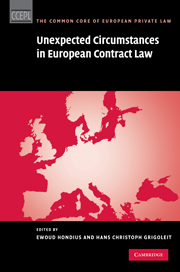Book contents
- Frontmatter
- Contents
- List of contributors
- Books in the series
- General editors' preface
- Preface
- List of abbreviations
- Part I Introduction and context
- Part II Overview
- Part III The case studies
- 5 Questionnaire
- 6 The case studies
- Part IV General comparative remarks
- Appendix: Some Texts on Change of Circumstances
- Selected bibliography
- Index
- References
6 - The case studies
Published online by Cambridge University Press: 04 April 2011
- Frontmatter
- Contents
- List of contributors
- Books in the series
- General editors' preface
- Preface
- List of abbreviations
- Part I Introduction and context
- Part II Overview
- Part III The case studies
- 5 Questionnaire
- 6 The case studies
- Part IV General comparative remarks
- Appendix: Some Texts on Change of Circumstances
- Selected bibliography
- Index
- References
Summary
EQUIVALENCE OF EXCHANGE IS DISTORTED
Case 1 ‘Canal de Craponne’
Long-term agreement – devaluation of the price agreement
Early in the twentieth century, the farmers X and Y entered into a contract under which X promised to build and maintain an irrigation channel; Y was entitled to extract water at a fixed price. The contract was concluded for an unlimited period of time. Almost 100 years later, X's successors ask for an increase in the price arguing that due to inflation and a rise in the cost of maintenance as well as labour the agreed price has become completely inadequate.
Is the claim by X's successors justified? Are they, alternatively, entitled to terminate the contract?
Germany and related jurisdictions
Germany
X's successors are entitled to claim adjustment under German law. Depending on the circumstances, X's successors may also have a right to terminate the contract.
I. In the given case, the parties did not include an express or implied provision for the impact of long-term inflation. The depreciation can also not be dealt with by interpreting the contract on the basis of the parties' hypothetical will. Thus, the contract itself cannot be drawn upon to eliminate the disproportionality between the contractual obligations caused by inflation.
II. Furthermore, X's successors are not absolved from the contractual obligation on the ground of practical impossibility (§275 II BGB).
- Type
- Chapter
- Information
- Unexpected Circumstances in European Contract Law , pp. 181 - 640Publisher: Cambridge University PressPrint publication year: 2011



